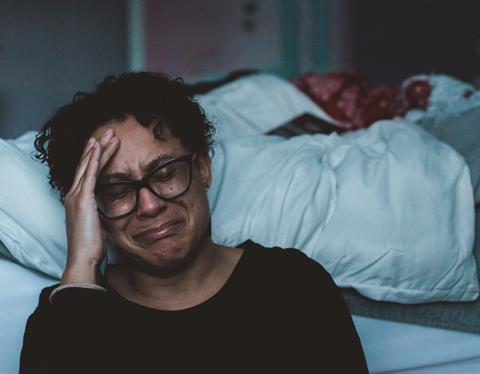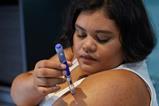Mental health campaigner Hope Virgo explains the additional challenges people with eating disorders face in the Church and how we can all do better.

I stood there staring at my reflection in the mirror, wiping the sweat off my upper lip. I splashed myself with cold water looking at my face in the reflection and it barely felt recognisable. I counted to ten and left the bathroom. The sun hit me immediately as I headed to the main tent to find the rest of the youth group. As I sat, listening to yet another message about how much God loves us and how we are made in his image, all I could think about was the last few days, months, years. How I had just before the meeting been purging in the bathroom. How I was consumed by calorie counting in my head. And as I sat there looking round others, the intense shame that I felt grew. The shame that there was something categorically wrong with me, a shame that was keeping me in this space and leaving me to suffer in silence.
This was me, Soul Survivor 2006, just a few months before being admitted to mental health services, being diagnosed with anorexia nervosa, which ended in a year long stay in a mental health hospital. While it wasn’t the church’s fault that I ended up in treatment, being in an environment where there was very little understanding of eating disorders, and no one who spoke about them meant that I stayed quiet.
While it wasn’t the church’s fault that I ended up in treatment, being in an environment where there was very little understanding of eating disorders, and no one who spoke about them meant that I stayed quiet.
Eating disorders have almost tripled between 2007 and 2019, but the pandemic saw a further surge in cases. According to NHS Digital’s 2019 Health Survey for England, 16 per cent of those aged 16 and up screened positive for a possible eating disorder in the previous 12 months. In the most recent 2022 NHS Digital Child Mental Health Survey, the rate of a broader measure of possible eating problems was an alarming 12.9 per cent in children aged 11 to 16, 60.3 per cent in 17 to 19-year-olds, and 62.2 per cent in 20 to 23-year-olds.
Despite their high prevalence, eating disorders are frequently misunderstood and massively stigmatised. They are often viewed as a lifestyle choice, a phase that only affects white underweight teenage girls who grow out of their illness. In contrast, the serious trend affects people of all ages, sizes, genders, and ethnicities. Even though more people are talking about eating disorders the stigma is still there. And what’s more, the stigma is often amplified in the church. People being told they don’t have enough faith and that is why they are not getting healed, people being told they are not praying hard enough, or that they simply have to love themselves because God made them that way. I get messages daily from people about how the Church has treated their eating disorder often leaving the individual to feel abandoned.
The stigma around eating disorders is often amplified in the church.
On April 22, thousands will take to the street to march for every single person affected by an eating disorder. People will march in remembrance of loved ones who they have lost, they will march for services, funding and future generations, making a stand against eating disorders. Alongside the march, there is an open letter which talks about the urgent need to tackle the National scandal. In the letter, the calls include proper investment into treatment to meet the demand, and to make a commitment to a public stand-alone strategy to tackle this national emergency.
Mental health campaigner, Suzanne Samaka said: “I have seen the catastrophic results that eating disorders can have on the person suffering, as well as the wider family and friends of that person. It affects every aspect of their life for a significant amount of time. As a family member you feel completely helpless and need much more support than is currently available, to ensure you can find a way through this awful time for your loved one. This march is key to highlighting to the government how much support the individuals and family networks need. We cannot do this on our own.”
As the Church, and as Christians, we must do better if we are going to love others as we were commanded to do. Here is how you can step up:
-
Sign and share this open letter: No-one should be dying of an eating disorder in 2023 (organise.network)
-
Have representation from you and your church at the march: Join us to March and fight for those affected by eating disorders Tickets, Sat 22 Apr 2023 at 10:30 | Eventbrite
-
Bring conversations about eating disorders into the light so people can heal. And in these conversations, remember eating disorders don’t have one look!




































No comments yet